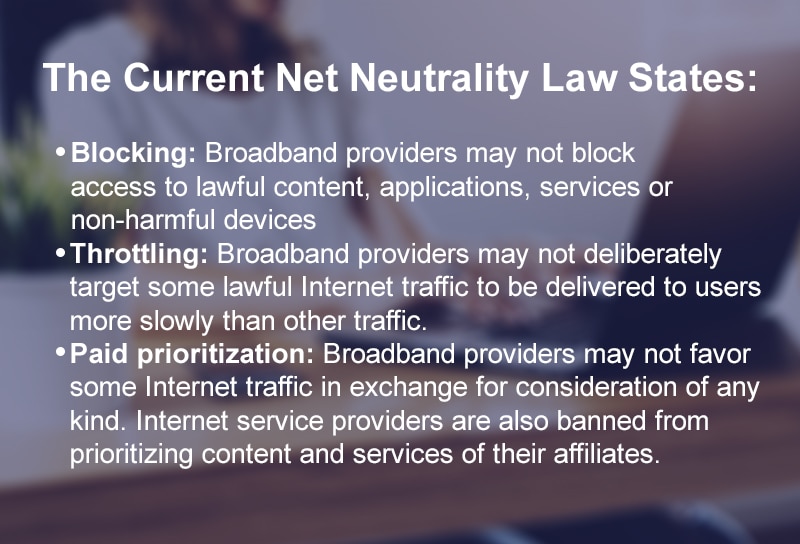How the proposed changes in Internet regulation will impact you and your business.
Is it the end to net neutrality? It’s up for a vote by the FCC in December.
I don’t know about you, but there are so many policy issues of urgent status dominating the news every single day, my head is spinning. It’s hard for even the most diligent of us to keep up.
But there is one issue bubbling to the surface that you may not fully understand or be aware of that will have a significant impact on every single citizen of the United States: net neutrality. Specifically, the FCC will vote on December 14 to end net neutrality on the Internet, and it will change everything.
What is Net Neutrality?
So – what exactly is this “net neutrality” thing? Net neutrality refers to an “open Internet.” It allows citizens and consumers to control their own online experience. Specifically, it requires internet providers (ISPs) to treat all websites the same. If you want to watch ESPN or YouTube videos, these providers can’t play favorites by changing the site speed or the way these websites’ content is delivered.
How Does the End of Net Neutrality Impact You and Your Business?
The Internet is an information super-highway, right? So what if information and entertainment on this highway had required lanes. Let’s say you’re driving down the highway in your Dodge Caravan, filled with pre-teen soccer players. Your best friend is driving down the same highway in a gorgeous, highly-coveted Mercedes. Your car is only allowed to drive in the slow lane, but her car is allowed in the fast lane.
The question as it relates to the end of net neutrality is this: will this new law enable these two different cars (which represent your website) to split into fast lanes and slow lanes (which represent internet services)? In other words, should telecom companies be allowed to serve as gatekeepers to what information gets the better lane to your house or office?
What’s Going On?
On November 22nd, the FCC released a 200-page final draft to end or significantly modify net neutrality on the Internet (if you want to read this lengthy document, here is the link). Although I’m still in the process of reading it (it’s huge), the change enables a regulatory framework under which ISPs (Verizon, AT&T, Comcast, etc.) will be permitted to prioritize traffic and limit access to certain sites.
What Could Happen?
You may see providers charge companies like Netflix or Amazon for priority delivery of their content (paying for the fast-lane), and they will likely pay it. Personally, I love these companies, but we all know these fees won’t likely hurt them too much, as they are doing pretty well right now. But what if your business isn’t on the same playing field as Amazon or Netflix? Can you afford to pay for priority treatment on the web?
The truth is that these large companies like Amazon, Google and Facebook already get favorable treatment on the web, because ISPs like Comcast run dedicated servers for them. In addition, only a small number (and getting smaller) of these ISPs control the sites and information that reach homes, businesses and consumers.
The net neutrality discussion is complicated. And there is more to this issue than fast lanes. But one thing is for sure, this proposed change will impact you.
There are clear winners and losers if this law changes.
There is no question delivering broadband, fast Internet services costs money. There are a lot of content and websites out there that impact ISPs’ costs of delivering this service. This is why the FCC is looking at this issue, and right now, it looks as though these changes will happen.
There will be clear winners and losers when this change happens. Should you care? We all should. And from Proof Digital’s perspective, we are particularly concerned about how it will likely hurt the small businesses we serve. Here are the winners and losers:
Winners
- Telecom industry
- AT&T
- Verizon
- Comcast
- Other large internet providers.
Losers
- Significant amount of consumers who view and/or buy from small sites
- Small businesses
- Start-ups
It’s a Toss Up
Some of these companies will win and some will lose:
- Dropbox, Ebay, Facebook, Google, LinkedIn, Microsoft, Amazon, Reddit, Tumblr, Yahoo!, and Twitter
- Other Internet focused businesses.
There is no question that companies who want to compete with these online leaders will likely be limited by their pocketbooks and remain in the slow lane. Those who have the resources to push out the smaller competitors might just move into the win category.
Who Owns the Content on the Web?
This is a question most people haven’t thought about. Does your company own your content, or do the internet hosting providers who pay to maintain it? Do the consumers who pay to connect to your content own it? Personally, I know that between my mobile data plan and my home and office internet bill, my family should own a piece of the pie.
Crazy enough, the Internet has only been around for 26 years. And those leading the charge in it’s amazing creation were adamant to make it totally open for all. Internet access has elevated the little guy, enabled the creation of so many companies and start-ups, and changed the way we consume information for good and for bad.
The leaders in the creation of the Internet argued and fought that no authority should be able to decide what kind of information was and wasn’t allowed. They believed the financial model should be that people pay for their access to bandwidth, and not for access to certain sites. Now, some countries have intervened and limited this access (see below).
Are you a winner or a loser?
This is a critical issue for all of us, and will impact our businesses. Will you be a winner or loser when it comes to this change? To find out more, explore these articles (some in support and some that oppose) about net neutrality on the list below:








